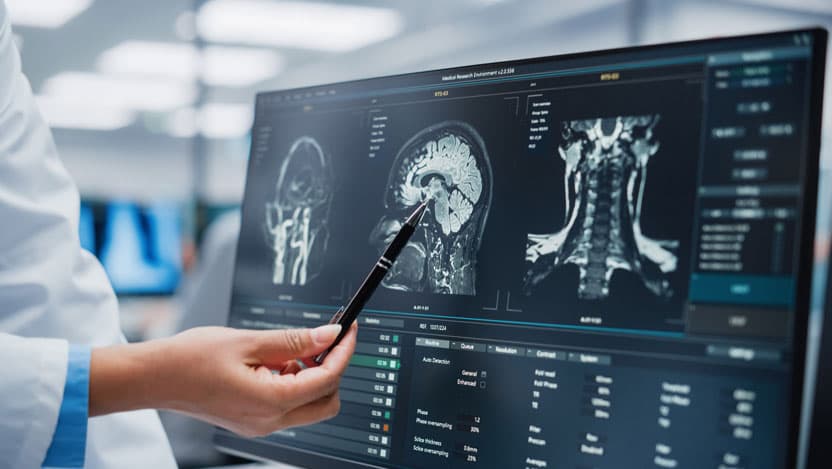What to know about brain tumors and brain cancer

Brain tumors — both benign and cancerous — are rare, scary and can be quite serious. University of Chicago Medicine neurosurgeon Bakhtiar Yamini, MD, Interim Chair of Neurosurgery, and neurologist Lauren Singer, MD, share insights on what to watch out for and when you should be concerned.
What are the symptoms of brain cancer?
Brain cancer is characterized by a malignant growth of cells in the brain or spinal cord. These malignant growths are called tumors, and the growth may spread to other areas of the brain. Some tumors are benign, meaning that they are not cancerous, but they can still cause problems in the brain.
Tumors in the brain and spinal cord can put pressure on brain tissue, induce swelling in the brain, and block the flow of cerebrospinal fluid (CSF), all of which can lead to increased intracranial pressure — pressure inside the skull. The location and nature of the tumor can influence its symptoms, as different regions of the brain control different behaviors and senses.
Increased intracranial pressure can cause symptoms such as:
- Headache
- Nausea and vomiting
- Vision changes and balance problems
- Personality and behavioral changes
- Difficulty thinking or speaking
- Seizures, drowsiness or coma
Most headaches are not caused by tumors, but headaches are one of the most common symptoms of a brain tumor. While most seizures are also not caused by brain tumors, seizures are experienced by up to half of all people with brain tumors, and often are the first warning sign that a tumor is present.
What causes brain cancer?
Usually the cause of brain cancer or a brain tumor is not clear. However, in some cases, individuals with a family history of brain tumors are more likely to have a brain tumor themselves. Individuals who are exposed to ionizing radiation (such as those used for radiation therapy for cancer and the radiation produced by atomic bombs) are also at increased risk of brain tumors.
Brain tumors can also be secondary to cancerous tumors elsewhere in the body, which may spread to the brain through no known lifestyle or environmental exposures that have been found to cause brain tumors.
What kinds of brain tumors are there?
There are many different kinds of malignant and benign brain tumors, depending on the location and cellular makeup of the tumors. These include:
- Astrocytoma
- Glioblastoma
- Medulloblastoma
- Meningioma
- Acoustic neuroma
- Oligodendroglioma
- Pituitary adenoma
- Ependymoma
How are brain tumors diagnosed?
The first step is a neurological exam, where a doctor will check your vision and hearing as well as your balance, coordination and strength. These diagnostic tests can help narrow down what areas of your brain are affected by a tumor.
The next step may be an imaging test, such as an MRI (magnetic resonance imaging) or a CT scan (computerized tomography). These tests can allow doctors to identify possible tumors in the brain and develop a treatment plan. Doctors may also use imaging tests to look for possible cancerous tumors in other areas of the body, if they think the tumor is a sign of metastasis.
Finally, doctors may conduct a biopsy to collect a sample of the tumor tissue. This can be done with a very fine needle, or tissue may be collected as part of a larger surgery (such as a tumor removal). The biopsy sample can be examined in the laboratory and provides doctors with a great deal of information about the tumor type and prognosis, as well as informing treatment options.
How are brain tumors treated?
The UChicago Medicine Brain Tumor Center offers the latest treatment options for patients with cancerous or non-cancerous brain and spinal cord tumors. Your physician will discuss your best treatment options, taking into consideration all aspects of your tumor.
Our brain and spine tumor board also reviews individual cases to tap into the expertise of our leading doctors in determining the most effective approaches to managing your tumor, including surgery, radiation and chemotherapy.
Is brain cancer curable?
Whether or not a brain cancer is curable depends on the type of cancer and its location. If the cancer has not spread, some kinds of brain tumors can be cured by a complete surgical removal. However, brain tumors often reoccur.

Bakhtiar Yamini, MD
Bakhtiar Yamini, MD, is Director of Neurosurgical Oncology. He specializes in neuro-oncology and is an expert in minimally invasive neurosurgery for children and adults. His research focuses on how brain tumors resist treatment and the development of new treatments, including the use of biodegradeable nanoparticles.
Learn more about Dr. Yamini
Lauren Singer, MD
Lauren Singer, MD, is a board-certified neurologist with a specialty in neuro-oncology. Dr. Singer is an expert in diagnosing and treating both primary and metastatic brain tumors, spine tumors and other nervous system tumors.
Learn more about Dr. Singer
Brain and spinal cord tumor care
The University of Chicago Brain Tumor Center is at the forefront of sophisticated care for primary and metastatic tumors of the central nervous system (CNS), including brain and spinal cord tumors.
Learn more about our brain tumor services